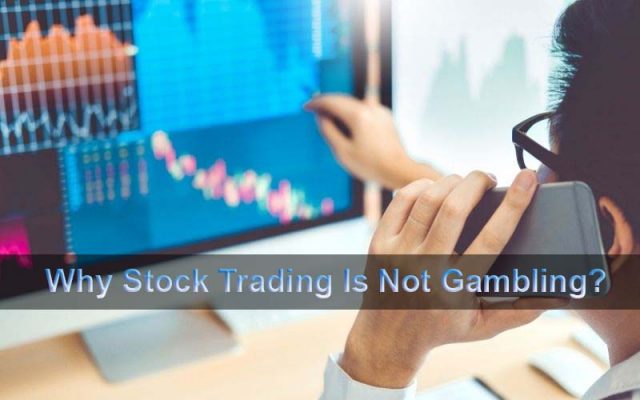8 Reasons Why Stock Trading Is Not Gambling

Is the stock market gambling? Should individuals believe exchanging the stock market to be a form of gambling? The responses to these inquiries are unequivocal – No! Investing in the stock market isn’t gambling, and amateur investors ought not to consider it around there. Comparing the stock market to gambling is a fantasy that individuals on the web and TV pundits have sustained for years. What’s more, it’s false.
While investing and gambling have a couple of comparable attributes, they are a lot of various. What’s more, if an investor doesn’t take exchanging stocks or buying shares of common assets truly and likens it to gambling, they are in genuine peril of losing money or passing up gains from the stock market that they need for retirement.
Why Stock Trading Is Not Gambling

Stock Is Ownership
Investors should recollect that they are buying ownership in an organization when they buy shares of normal stock. Investors own a tiny portion of the organization. That is the reason individuals love buying jars of Dr. Pepper. It seems like more money is at last returning into their pocket with each sip. Buying shares of an organization is comparable to having a case on the resources, obligations, and more importantly a little part of the benefits of the organization whose shares you buy. Frequently, investors see buying shares of an organization just as exchanging stocks. They forget that they are presently proprietors of the organization too.
To acquire a benefit and procure a benefit on your stock exchanging, investors should attempt to measure the organization and its productivity. Incorrectly measuring benefit in the short and, more importantly, over the long haul is the reason stock prices change on the stock trades. The benefit standpoint for business is always showing signs of change, and investors are utilizing stock charts, news, rumors, organization measurements, and major examination to appraise the future earnings of an organization and consequently the value of its stock later on.
The Value Of A Company
Attempting to determine the value of an organization’s stock price and where it’s going, later on, isn’t simple. Many factors move the short-term price of an organization’s stock. They frequently have all the earmarks of being irregular, yet they’re not actually. Over longer terms, an organization’s stock is the current value of all benefits that the organization will make. In the short term, an organization’s offer price is much more volatile. An organization can exchange shares even without benefits since investors feel that the organization will have future earnings. In any case, in the long run, an organization’s stock price will show the genuine value of the organization.
Similitudes In Investing And Gambling Strategies
Studying Behavior
Investors and gamblers study chances and search for an edge to upgrade their performance. With gambling, particularly games like blackjack and poker, players study behavior. They take a gander at the quirks and patterns of their adversaries. This assists them with acquiring valuable information to impact their wagering and strategy.
Investors study exchanging patterns through stock charts to foresee a stock’s price later on. Investors have a particular benefit with acquiring information. Organization information is readily accessible on the web and through organization filings with the Security and Exchange Commission (SEC). Investors can discover an abundance of information in the SEC’s Edgar database on organization stock filings. In the Edgar database and friends filings, you can discover the kinds of resources that companies hold and if they are a holding organization that different firms under its umbrella.
Risk
Both investing and gambling imply risk. You need to risk capital to acquire value in both the stock market and a gambling club. The risk investors and gamblers take on to give them the option to procure more than they bet. The two investors and gamblers should know how much risk they can tolerate, however. Each investor and gambler has a specific risk tolerance that they will lose. You should know your risk tolerance before you begin investing or gambling. Not realizing when to stop or sell will make you defenseless against possibly losing more than you proposed.
Contrasts In Investing Strategies And Gambling
Zero-Sum Game
In contrast to investing where there are moderate winners and surprisingly a few losers over the long and short term, gambling is a zero-sum game. There must be a winner and a loser with gambling. Gambling takes money from a loser and gives similar money throughout to a winner without fail. In investing, there can be differing levels of winners and losers. There can be total losers or total winners, but since investors buy and sell as opposed to sitting tight for a gambling hand to be finished, they can have partial winners and partial losers.
Be that as it may, with gambling, no value is at any point made. The value or money bet is essentially moved to start with one gambler then onto the next. Investing expands the general abundance of the economy. With investing, companies increment their productivity and grow new products that improve individuals’ lives. Companies make benefits and offer those benefits through dividends to investors. Investing makes abundance over the extremely long haul for investors and isn’t equivalent to gambling’s zero-sum game.
Limits To Investing Losses
Investors can frequently limit their losses and escape an exchange if they begin to lose money. Stock investors can build up an exchanging order called a stop loss with their broker or online brokerage firm to limit their losses. Numerous people regularly quickly submit a stop loss request in the wake of buying shares 10% lower than their price tag if the organization is hit by a selling craze before they can get in to sell their shares.
Sometimes, they’ll submit a comparative limit request when they’re swing trading to sell shares at their target upside price too to secure their target overall revenue. Commonly they’ll search for a 10% rise in stock while swing trading, and they regularly put in limit requests when they buy a stock.
Time Horizons For Trading And Gambling
Time horizons are another distinction between investing and gambling. They are not quite the same as gambling regardless of whether you’re day exchanging, swing exchanging, or essentially buying and holding your ventures. Most gambling is a time-based occasion that has a set end time or date where you see if you’ve won or lost your bet. Investing can proceed inconclusively now and again.
Numerous companies pay dividends to investors and award them for bought shares for years. You can lose money on paper as your speculation value decreases, however profit-paying stocks will keep on paying you normally each quarter to hang tight for a bounce back. With gambling, you either need to win or lose the money that you bet. There is no center ground.
Limited Information
In contrast to investing, there is just a limited measure of information while you are gambling. You might have the option to get a couple of signs from the table or hear a couple of protests from your kindred blackjack players at a gambling club on whether the table is hot or cold. However, that is pretty much the entirety of the information that you’ll get.
Investing is extraordinary. There is a plethora of information about the companies you put resources into through online forums, stock analysts’ reports, conference calls, organization filings, and so forth. While gamblers are practically oblivious in regards to any inside information that can assist them with getting an edge on their competition.
Gambling and investing have a ton of likenesses. In any case, they are likewise totally different. Investing in the stock market isn’t gambling. Comparing the stock market to gambling is an essentially false legend. Both imply risk and each hopes to boost benefit, however, investing isn’t gambling. What’s more, gambling isn’t investing. Each assumes a novel part in our general public, yet investors ought not to befuddle where the likenesses end and make everyone special from the other.







